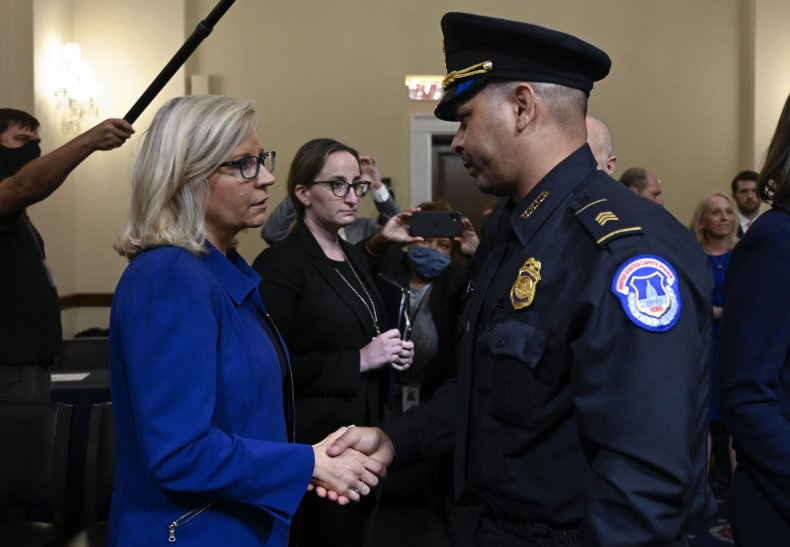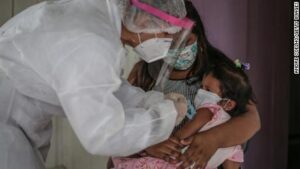The House Select Committee investigating the January 6 riots at the U.S. Capitol held its first hearing on Tuesday. Over the course of about three and a half hours, the committee members heard testimonies from four police officers who worked to protect the Capitol during the insurrection, as well as shared videos of the violent attacks.
The day was full of highlights, but below are five major moments:
1. Police suffered injuries at the hands of the violent, angry mob.
All the officers described in graphic detail the resistance they encountered while trying to prevent the insurrectionists from entering the Capitol, and, once the people broke inside, keeping them from getting their hands on the lawmakers.
The officers were subjected to an array of physical assaults. They were stunned with Tasers, sprayed with chemical irritants, punched, kicked, and struck with various objects. Washington Metropolitan Police Department Michael Fanone suffered a mild heart attack and a concussion. Capitol Police Sergeant Aquilino Gonell testified that he feared he was going to die.
Getty
2. Black officers were insulted with racial epithets.
Officer Harry Dunn, a 13-year veteran of the Capitol Police, spoke about the racist slurs the crowd called him. Dunn, who is Black, said, “No one had ever-ever-called me a n****r while wearing the uniform of a Capitol Police officer” before January 6.
He also recounted, “One officer told me he had never in his entire 40 years life being called a n****r to his face and that streak ended on January 6. Yet another Black officer later told me he had been confronted by insurrectionists in the Capitol who told him, ‘Put your gun down, and we’ll show you what kind of n****r you really are.'”
The officer also said he saw Thin Blue Line flags, which are meant to symbolize support of law enforcement, as well as Confederate flags in the crowd.
3. D.C. Metropolitan Police Officer Daniel Hodges repeatedly called the rioters “terrorists.”
When questioned why he kept referring to the people who took part in the riots as “terrorists,” Hodges read directly from U.S. Code Title 18, Part 1, Chapter 113B, section 2331, which states the meaning of terrorism.
The code defines domestic terrorism as “acts dangerous to human life that are a violation of the criminal laws of the United States or of any State; appear to be intended to intimidate or coerce a civilian population; to influence the policy of a government by intimidation or coercion; or to affect the conduct of a government by mass destruction, assassination, or kidnapping; and occur primarily within the territorial jurisdiction of the United States.”
Moments before quoting the code, Hodges provided a brief moment of levity when Maryland Representative Jamie Raskin asked him about politicians who “have been calling the violent insurrectionists not terrorists, but tourists. Why do you call the attackers terrorists, and what do you think about our colleagues who think we should call them tourists?”
“Well, if that’s what American tourists are like, I can see why foreign countries don’t like American tourists,” Hodges replied, prompting laughs from the lawmakers and those in attendance.
4. Republican Representatives Adam Kinzinger of Illinois and Liz Cheney of Wyoming reaffirmed their commitment to serving the committee and pursuing an investigation in the events that caused the Capitol riot.
In her opening remarks, Cheney said, “We must know what happened here at the Capitol. We must also know what happened every minute of that day in the White House—every phone call, every conversation, every meeting leading up to, during and after the attack.”
“Will we adhere to the rule of law, respect the rulings of our courts and preserve the peaceful transition of power?” she asked. “Or will we be so blinded by partisanship that we throw away the miracle of America? Do we hate our political adversaries more than we love our country and revere our Constitution?”
Kinzinger, who became choked up at times when addressing the police officers and defended accepting House Speaker Nancy Pelosi‘s appointment to the committee, saying he did so “not in spite of my membership in the Republican Party, but because of it.”
5. The committee still has work to do.
After the hearing wrapped up at around 1 p.m. EDT, Chair Bennie Thompson told reporters that the select committee will issue subpoenas soon. He did not name the recipients.
Thompson also said members will meet with Attorney General Merrick Garland to gather relevant information and that the committee would “follow the facts.”
“Well, we now have a body of testimony that we will review. We are in the process of putting that together. I’ve put some of the members on notice that they won’t enjoy the entire August recess, but we will give them time to work in their districts. Before the end of August recess,” Thompson said. He added the committee could have another hearing while the House is scheduled to be in a seven-week recess during August.



















